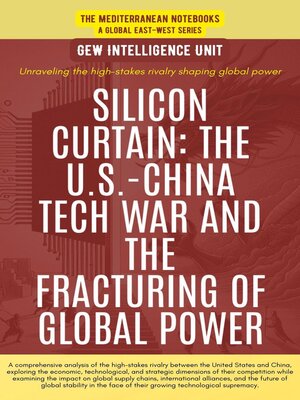Silicon Curtain
ebook ∣ The U.S.-China Tech War And The Fracturing Of Global Power · The Mediterranean Notebooks
By GEW Intelligence Unit

Sign up to save your library
With an OverDrive account, you can save your favorite libraries for at-a-glance information about availability. Find out more about OverDrive accounts.
Find this title in Libby, the library reading app by OverDrive.



Search for a digital library with this title
Title found at these libraries:
| Library Name | Distance |
|---|---|
| Loading... |
The 21st century's defining geopolitical contest is unfolding between the United States and China, two superpowers locked in a high-stakes rivalry that spans trade, technology, and global influence. Once economic partners, their relationship has devolved into a tense competition marked by tariffs, export controls, and a race to dominate critical technologies.
This book dissects the roots of this rivalry, tracing its evolution from China's economic rise under Deng Xiaoping to the Trump-era trade wars and Biden's strategic decoupling. It examines how Beijing's state-driven industrial policies—like Made in China 2025—clash with America's push for supply chain resilience through initiatives such as the CHIPS Act, exposing a fundamental ideological divide: state capitalism versus free-market innovation. At the heart of the conflict lies the battle for technological supremacy. From Huawei's 5G expansion and TikTok's data controversies to semiconductor bans and AI development, the U.S. and China are weaponising innovation to secure economic and military dominance.
The book explores how this "tech cold war" disrupts global supply chains, fractures international alliances, and forces nations like those in the EU and Southeast Asia to navigate a precarious neutrality. It also delves into secondary fronts, including cybersecurity threats, espionage allegations, and military posturing in the South China Sea, illustrating how competition spills beyond economics into broader strategic realms. Yet interdependence remains inescapable. Despite tariffs and sanctions, bilateral trade hit a record $690 billion in 2022, underscoring a paradox: both nations seek to reduce reliance on each other while remaining deeply entangled. The book analyses the risks of this duality, from inflationary pressures to the destabilisation of global institutions like the WTO. It concludes by evaluating potential futures—from managed competition to outright confrontation—and argues that the world's stability hinges on whether these giants can forge a precarious coexistence without triggering a new Cold War.







